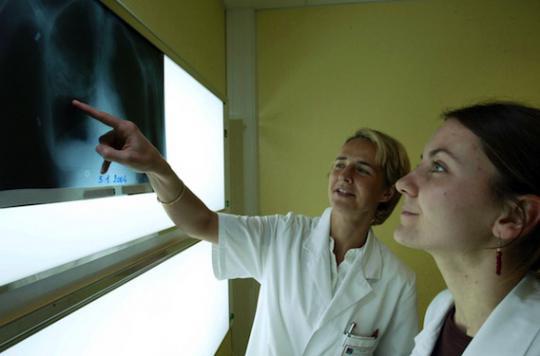The results presented at the ASCO annual meeting confirm the superiority of immunotherapy over standard chemotherapy in certain lung cancers.

- Non-small cell lung cancer (NSCLC) accounts for around 80% of lung cancers
- The current second-line treatment (docetaxel) offers modest efficacy
- Nivolumab improves overall survival in patients by an average of 3 months
The pace is picking up. After the delivery last February of a marketing authorization by the US Health Agency (FDA) for the treatment of non-small cell squamous cell lung cancer, nivolumab is raising new hopes.
The results presented Saturday, May 30 at ASCO, the annual meeting of the American Society of Clinical Oncology – high mass of world oncology -, show that nivolumab would be more effective, but also better tolerated than the standard treatment, for the taking in second-line burden of non-squamous cell non-small cell cancers. Results which could change the treatment recommendations for these cancers.
Limited treatment options
Non-small cell lung cancer, or NSCLC, includes several types of tumors, and represents nearly 80% of all lung cancers. Until now, patients with advanced non-small cell squamous cell cancer (or adenocarcinoma), whose disease continues to progress after treatment with chemotherapy with platinum salts, have few treatment options. The standard so-called “second-line” treatment today is docetaxel, another type of chemotherapy.
“But the prognosis for these patients remains poor,” explains Gérard Zalcman, pneumo-oncologist at the CHU de Caen. And this chemotherapy has a problematic benefit / toxicity ratio. “
Gérard Zalcman, pneumo-oncologist at Caen University Hospital: “Docetaxel is a chemotherapy used as a second line, the efficacy of which remains modest …”
Increased survival, decreased side effects
Nivolumab, however, could be a game-changer very quickly. This “anti-PDL1” antibody (see box) had already demonstrated an increase in the overall survival of patients with non-small squamous cell lung cancer presenting with metastases. The results of the phase III trial presented at ASCO this Saturday confirm this efficacy, but this time in patients with non-small cell non-squamous cell cancer who have failed treatment after initial chemotherapy. For Fabrice Barlési, pneumo-oncologist at the North Hospital of Marseille and co-author of this work, the results of this trial, associated with the previous ones, are a “revolution”.
Fabrice Barlési, pneumo-oncologist at the North Hospital of Marseille : “Even though these immunotherapies only work for a certain number of patients, they work better and for longer …”
In the 292 patients who received this treatment, the mean survival increased by approximately 3 months, compared to the 290 patients treated with docetaxel. The clinical trial also aimed to assess the safety of nivolumab, and the results are reassuring.
The treatment caused fewer side effects (fatigue, nausea, etc.) than docetaxel. “Immunotherapies do not cause the same inconveniences as chemotherapies, but they are not free from side effects, however, Gérard Zalcman warns. These side effects are different from those we have seen so far, they are most often due to autoimmune reactions, but it will take more perspective to know them better. “
Checkpoint inhibitors
Beyond the classic chemotherapies, another therapeutic avenue has been explored for the past ten years for the treatment of different types of cancer: immunotherapy. While chemo targeting cancer cells, immunotherapies aim to restore the immune system’s ability to “fight” effectively against cancer cells. Among the methods developed, the so-called “check-point inhibitor” method aims to remove the blockages that the tumor causes on T cells. Nivolumab is a monoclonal antibody which specifically targets the PD1-PDL1 system.
The next standard treatment?
Faced with such results, is nivolumab on the way to dethroning docetaxel? The question was at the heart of the discussions at the ASCO congress. For Gérard Zalcman, “docetaxel is going through its last years. “
Gérard Zalcman, pneumo-oncologist at Caen University Hospital: “It is clear that docetaxel risks seeing its indications extremely reduced …”
An opinion shared by many experts present at the congress, including Fabrice Barlési: “The benefit in terms of survival and the better tolerance profile compared to chemotherapy mean that nivolumab can be considered as a new standard in this indication and in second line. “
The specialist emphasizes, however, that the treatment is only effective in certain patients, and that the challenge today is to understand why. This would make it possible to develop tests to identify those to whom the molecule can benefit the most.
Currently, nivolumab has (since January 5) a temporary authorization for use (ATU) in the third line, that is to say when two treatments have failed. These new results should make it possible to broaden the indications for this ATU, and perhaps accelerate the marketing authorization process by the National Medicines Safety Agency.
.

















